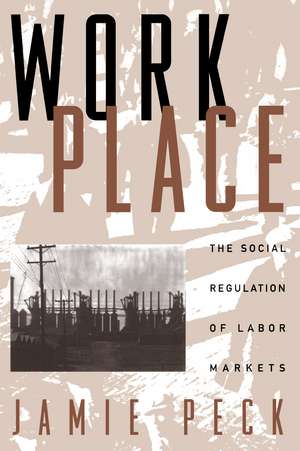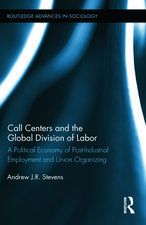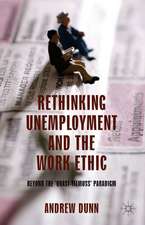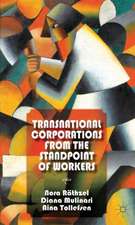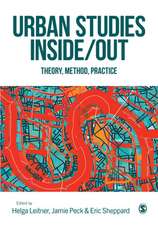Work-Place: The Social Regulation of Labor Markets: Perspectives on Economic Change
Autor Jamie Pecken Limba Engleză Paperback – 30 iun 1996
This book challenges the prevailing idea that labor markets are governed by universal economic processes. The author argues instead that labor markets develop in tandem with social and political institutions, and thus function in locally specific ways. Drawing on a critical reading of segmentation and regulation theory, the book examines ways that the spatially uneven development of labor markets affects work structure, job security, and labor relations in different regions. Peck integrates labor market theory with empirical case studies, laying the theoretical groundwork for an alternative regulatory agenda which might deprioritize short-term cost-effectiveness in favor of social protection, improved working conditions, and negotiated worker involvement
Preț: 295.10 lei
Nou
Puncte Express: 443
Preț estimativ în valută:
56.47€ • 58.74$ • 46.62£
56.47€ • 58.74$ • 46.62£
Carte tipărită la comandă
Livrare economică 14-28 aprilie
Preluare comenzi: 021 569.72.76
Specificații
ISBN-13: 9781572300446
ISBN-10: 1572300442
Pagini: 320
Ilustrații: figures, tables, references, index
Dimensiuni: 152 x 229 x 24 mm
Greutate: 0.51 kg
Ediția:New.
Editura: Guilford Publications
Colecția Guilford Press
Seria Perspectives on Economic Change
ISBN-10: 1572300442
Pagini: 320
Ilustrații: figures, tables, references, index
Dimensiuni: 152 x 229 x 24 mm
Greutate: 0.51 kg
Ediția:New.
Editura: Guilford Publications
Colecția Guilford Press
Seria Perspectives on Economic Change
Public țintă
Professional Practice & Development and UndergraduateCuprins
1. Introduction: Places of Work
I. Making Labor Markets
2. Making Workers: Control, Reproduction, and Regulation
3. Structuring the Labor Market: A Segmentation Approach
4. Locating the Local Labor Market: Segmentation, Regulation, Space
II. Placing Labor Markets
5. Flexibilizing Labor: Insecure Work in Unstable Places
6. Domesticating Work: Restructuring at Work, Restructuring at Home
7. Building Workfare States: Institutions of Labor Regulation
8. Localizing Labor: Geopolitics of Labor Regulation
9. Epilogue: Local Dialectics of Labor
I. Making Labor Markets
2. Making Workers: Control, Reproduction, and Regulation
3. Structuring the Labor Market: A Segmentation Approach
4. Locating the Local Labor Market: Segmentation, Regulation, Space
II. Placing Labor Markets
5. Flexibilizing Labor: Insecure Work in Unstable Places
6. Domesticating Work: Restructuring at Work, Restructuring at Home
7. Building Workfare States: Institutions of Labor Regulation
8. Localizing Labor: Geopolitics of Labor Regulation
9. Epilogue: Local Dialectics of Labor
Notă biografică
Jamie Peck is reader in economic geography and member of the International Centre for Labour Studies at the University of Manchester. He has published extensively on labor market theory, regional economic restructuring, employment policy evaluation, and the geopolitics of economic governance and social regulation. A research associate of the Centre for Local Economic Strategies, his research has been supported by the UK Economic and Social Research Council, the European Science Foundation, the Commonwealth Fund (New York), and the Australian government, while he has consulted to the European Commission, the UK Department of Employment, and numerous local authorities, labor unions, and economic development agencies. He is currently researching the political economy of welfare reform on a Harkness Fellowship at the Johns Hopkins University, Baltimore.
Recenzii
This is an ambitious book, incorporating multilayered conceptualizations of local labor markets in ways that push beyond the explanations in neoclassical economic, labor segmentation, and regulation theory of their structures....a truly monumental achievement that is sure to redefine the course of current research in economic and industrial geography, as well as beyond the disciplinary boundaries. --Meghan Cope, Department of Geography, State University of New York at Buffalo, Journal of Regional Science
...Intelligent and intellectually rewarding...No labor market theorist, or researcher for that matter, can ignore this book. --R. A. Beauregard, New School for Social Research in Choice
Jamie Peck has written the definitive treatment of labor markets. His approach is at once quite original and provocative, integrating many threads and themes in the academic literature with a rare appreciation of the role that public policy plays (and does not play) in structuring the nature and performances of local labor markets. It is a book that all social scientists can read with profit; it is a book that will make an enormous difference to research in the field over the coming years. --Gordon L. Clark, University of Oxford
Economists imagine that the process by which workers and job openings are matched is roughly analogous to the buying and selling of personal computers, shirts, or football tickets: regulated by supply and demand, mediated by price. In fact, 'the labor market' is governed by contradictory and intensely conflictual institutions and social norms. Moreover, the forms of social regulation--especially the nature and extent of labor market segmentation--vary from one locale to another. The particular histories of and conditions within these localities matter to how their labor markets operate. Furthermore, these spatial differences directly reinforce unequal power relations between workers and their employers, which in turn shape the location choices of business and the distribution of income.
Peck's great achievement is to unify these dimensions info one coherent conception. This is a tremendous intellectual accomplishment, which will have a powerful and lasting impact on all the social sciences, not only geography. --Bennett Harrison, Visiting Professor of Political Economy, John F. Kennedy School of Government, Harvard University; author of Lean and Mean, and co-author of The Deindustrialization of America
Jamie Peck's book, Work Place, is an important, path-breaking account of labor's place in capitalist space. In a text that is theoretically sophisticated, richly detailed, incisively argued, and highly accessible, the author proceeds from dilemmas and contradictions inherent in labor power as a fictitious commodity to reveal the complex, spatially uneven nature of the socially imbedded, socially regulated nature of labor markets. Whilst synthesizing much of the best recent work in institutional economics, the regulation approach, and economic geography, Peck goes well beyond it in placing labor markets and institutions in various local, regional, national and supra-national contexts and in showing how workers and work are continually being replaced in Fordism, the crisis of Fordism, and the search for 'after' Fordism solutions. The arguments of Work Place are bound to shape the research agenda on these and many other issues. I recommend it unreservedly. --Bob Jessop, Professor of Sociology, Lancaster University
-...Intelligent and intellectually rewarding...No labor market theorist, or researcher for that matter, can ignore this book. --R. A. Beauregard, New School for Social Research in Choice
Jamie Peck has written the definitive treatment of labor markets. His approach is at once quite original and provocative, integrating many threads and themes in the academic literature with a rare appreciation of the role that public policy plays (and does not play) in structuring the nature and performances of local labor markets. It is a book that all social scientists can read with profit; it is a book that will make an enormous difference to research in the field over the coming years. --Gordon L. Clark, University of Oxford
Economists imagine that the process by which workers and job openings are matched is roughly analogous to the buying and selling of personal computers, shirts, or football tickets: regulated by supply and demand, mediated by price. In fact, 'the labor market' is governed by contradictory and intensely conflictual institutions and social norms. Moreover, the forms of social regulation--especially the nature and extent of labor market segmentation--vary from one locale to another. The particular histories of and conditions within these localities matter to how their labor markets operate. Furthermore, these spatial differences directly reinforce unequal power relations between workers and their employers, which in turn shape the location choices of business and the distribution of income.
Peck's great achievement is to unify these dimensions info one coherent conception. This is a tremendous intellectual accomplishment, which will have a powerful and lasting impact on all the social sciences, not only geography. --Bennett Harrison, Visiting Professor of Political Economy, John F. Kennedy School of Government, Harvard University; author of Lean and Mean, and co-author of The Deindustrialization of America
Jamie Peck's book, Work Place, is an important, path-breaking account of labor's place in capitalist space. In a text that is theoretically sophisticated, richly detailed, incisively argued, and highly accessible, the author proceeds from dilemmas and contradictions inherent in labor power as a fictitious commodity to reveal the complex, spatially uneven nature of the socially imbedded, socially regulated nature of labor markets. Whilst synthesizing much of the best recent work in institutional economics, the regulation approach, and economic geography, Peck goes well beyond it in placing labor markets and institutions in various local, regional, national and supra-national contexts and in showing how workers and work are continually being replaced in Fordism, the crisis of Fordism, and the search for 'after' Fordism solutions. The arguments of Work Place are bound to shape the research agenda on these and many other issues. I recommend it unreservedly. --Bob Jessop, Professor of Sociology, Lancaster University
...intelligent and intellectually rewarding...No labor market theorist, or researcher for that matter, can ignore this book.
--Choice, 4/8/1996Descriere
This text seeks to construct a conception of the labour market, which is sensitive to the variability in labour market experiences and processes, taking account of the tensions between the global economy and the local organization of labour markets.
